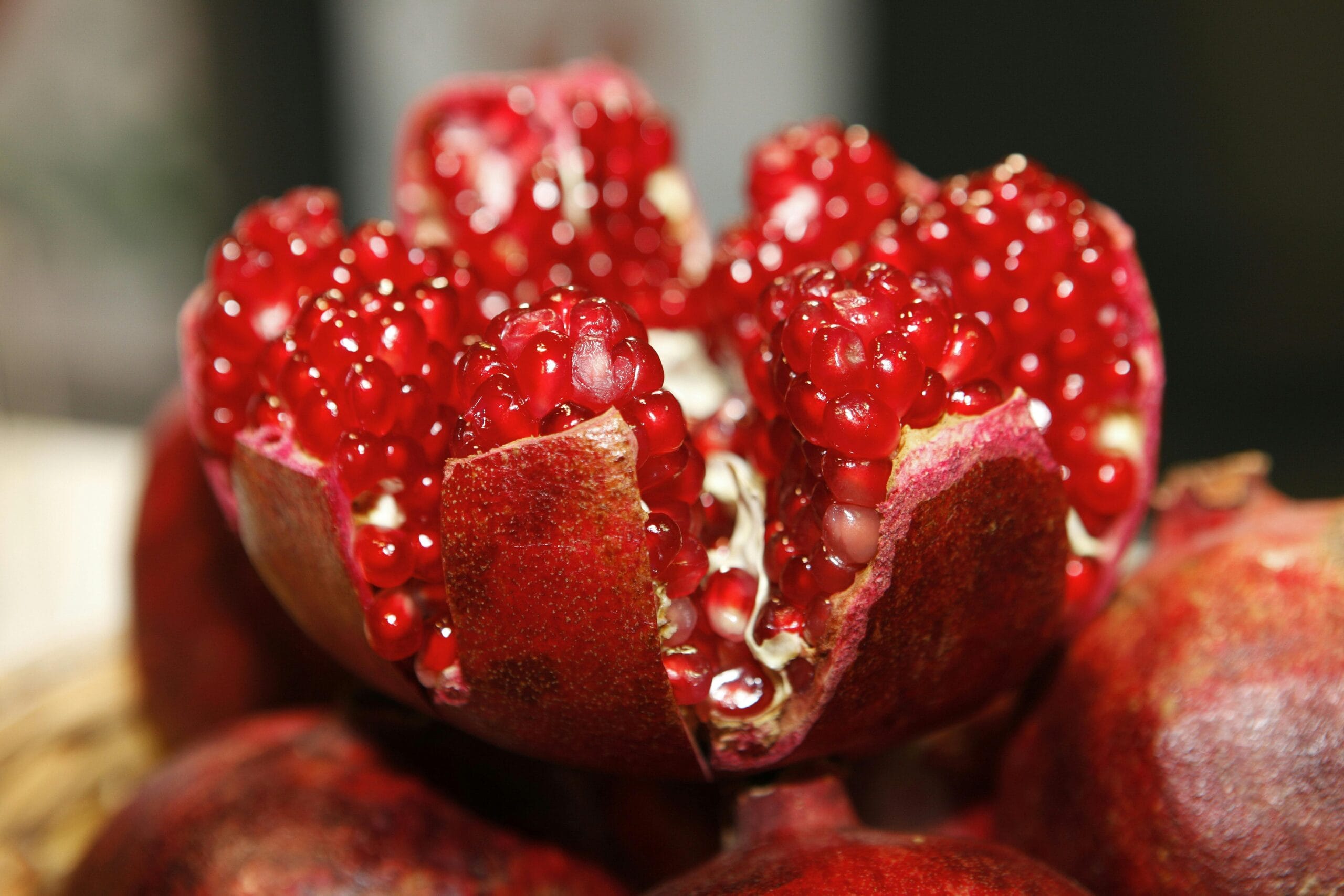Introduction
Pomegranate, scientifically known as Punica granatum, is a unique and vibrant fruit characterized by its rich red color and a multitude of arils, or seed casings, that are filled with juicy, flavorful pulp. This delectable fruit has origins that trace back thousands of years, believed to have been first cultivated in the regions of modern-day Iran and the surrounding areas. Its cultivation spread across the Mediterranean and into northern Africa, eventually finding its way to many parts of the world, including India, China, and the Americas.
The pomegranate is more than just a visually stunning addition to fruit baskets; it is also celebrated for its nutritional profile. Rich in essential vitamins such as vitamin C, and containing a variety of minerals including potassium and magnesium, pomegranates offer a plethora of health benefits. The antioxidants found within the fruit are abundant and contribute to its status as a superfood, playing a significant role in combating oxidative stress and inflammation in the body.
Culturally, pomegranates have held symbolic significance throughout history. They are often associated with fertility, prosperity, and abundance in various traditions. Paintings, literature, and folklore from ancient civilizations illustrate the fruit’s importance and revered nature, marking it as a blessing in many societies. In addition to their cultural representation, pomegranates have found their place in various cuisines globally, often added to salads, desserts, and beverages for their sweet-tart flavor profile.
Understanding the pomegranate, its origins, and its nutritional attributes lays the groundwork for exploring its numerous health benefits and potential uses in daily life. With their vibrant appearance and unique flavor, pomegranates not only appeal to the senses but also offer a rich bounty of nutrients beneficial for overall well-being.
Health Benefits of Pomegranate
Pomegranate is widely recognized for its extraordinary health benefits, largely attributed to its rich composition of antioxidants, vitamins, and minerals. This striking red fruit is packed with polyphenols, particularly punicalagins and anthocyanins, which are potent antioxidants that help combat oxidative stress in the body. Research indicates that these antioxidants can significantly reduce inflammation, playing a crucial role in preventing chronic diseases such as heart disease and diabetes. The anti-inflammatory properties of pomegranate may also aid in alleviating symptoms associated with conditions like arthritis.
Moreover, there is promising evidence to suggest that pomegranate may contribute to heart health. Studies have shown that regular consumption of pomegranate juice can lead to improved cholesterol levels, providing a protective effect against cardiovascular diseases. This fruit has been observed to reduce high blood pressure and improve blood circulation, primarily due to its ability to enhance endothelial function. Maintaining a healthy heart is paramount, and incorporating pomegranate into one’s diet may serve as a beneficial strategy in promoting cardiovascular wellness.
In addition to its protective effects on heart health, pomegranates are a nutritional powerhouse. They are an excellent source of vitamin C, vitamin K, and potassium, along with a variety of essential micronutrients. The presence of these vitamins and minerals supports various bodily functions, including immune response and bone health. Furthermore, pomegranates offer dietary fiber, which aids in digestion and contributes to satiety, making it a favorable option for those looking to manage their weight.
Overall, the health benefits of pomegranate are manifold, backed by a growing body of scientific research. By integrating this vibrant fruit into one’s diet, individuals can harness its antioxidant properties, reduce inflammation, and support heart health, all while enjoying its delicious taste.
Daily Uses of Pomegranate
Pomegranate, a nutrient-dense fruit, can be seamlessly integrated into various daily meals and snacks, providing an array of vitamins and minerals that contribute to a balanced diet. One of the simplest ways to enjoy pomegranate is by consuming its fresh arils. These jewel-like seeds can be sprinkled on top of salads or mixed into yogurt for an added crunch and flavor. The vibrant color and sweet-tart taste of pomegranate can enhance both the visual appeal and the nutritional value of your dishes.
Another popular method of incorporating pomegranate into daily diets is by making fresh juice. Pomegranate juice is not only refreshing but is also rich in antioxidants and essential vitamins. For a nutritious smoothie, blend pomegranate juice with your choice of fruits such as bananas and berries, along with a handful of spinach for a health boost. This vibrant drink can serve as an energizing breakfast or a post-workout replenisher.
Pomegranate extracts are also available as dietary supplements and can be easily added to various recipes. These extracts capture the essence of the fruit’s beneficial compounds, allowing you to enjoy its advantages in a concentrated form. For culinary enthusiasts, consider using pomegranate molasses, a thick syrup made from the juice, as a dressing for salads or a glaze for roasted meats. Its unique flavor profile can elevate a mundane dish, making it more exciting.
For those with a sweet tooth, pomegranate can be used in desserts. A simple pomegranate parfait with layers of granola and yogurt or pomegranate-infused cheesecake can satisfy cravings while offering a dose of vital nutrients. Exploring the various applications of this versatile fruit can enhance your meals while promoting overall health, thanks to its abundance of vitamins and minerals.
Pomegranate and Weight Loss
Pomegranates, often celebrated for their nutritional profile, play a significant role in weight management. These vibrant fruits are not only rich in vitamins and minerals but also contain unique compounds that can aid in reducing appetite and enhancing metabolic rates. The remarkable combination of fiber and antioxidants found in pomegranates contributes to feelings of fullness, thus potentially leading to decreased caloric intake throughout the day. This satiating effect can be particularly beneficial for individuals aiming to lose weight without feeling deprived.
Research has indicated that the regular consumption of pomegranate may stimulate fat burning processes in the body. A study published in a reputable journal revealed that pomegranate extract improves lipid profiles and aids in the reduction of body weight when combined with a nutritious diet. Additionally, the presence of polyphenols in pomegranates can aid in regulating glucose levels, which helps in reducing unhealthy cravings. By incorporating this fruit into a daily diet, individuals may find it easier to maintain a consistent, healthy eating pattern.
Integrating pomegranates into a balanced diet can be quite straightforward. They can be enjoyed as a whole fruit, added to smoothies, or even included in salads to provide a burst of flavor and nutrition. Pomegranate juice, while beneficial, should be consumed in moderation due to its higher sugar content; however, it still retains many of the fruit’s health benefits. For those aiming to control their weight, incorporating pomegranates can not only enhance dietary enjoyment but also support overall metabolic health. Therefore, considering pomegranates as a staple in one’s diet may yield significant advantages in the quest for effective weight loss.









